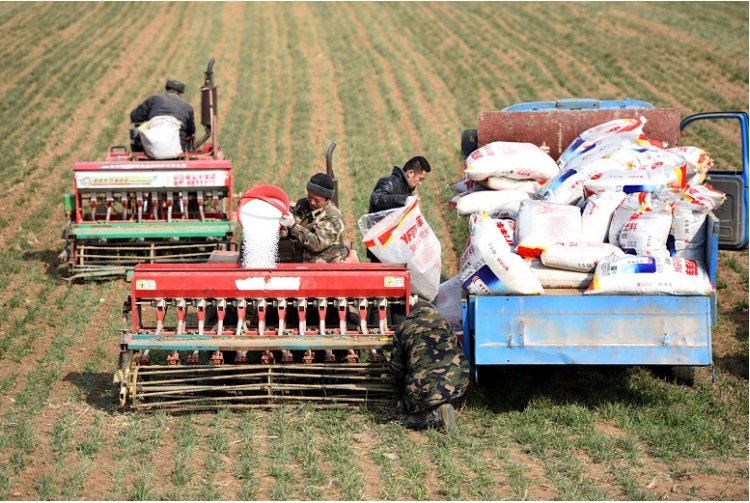We Will Never Let Major Producing Areas Lose Out On Grain
Release Date:2022-03-13
National spring agricultural production and strengthening winter wheat field management conference was held in Dezhou city, Shandong Province east of China on February 13. Premier Li Keqiang, also a member of the Standing Committee of the Political Bureau of the CPC Central Committee, issued an important instruction, stressing that the annual grain output should continue to exceed 500 million metric tons to ensure food security.
Food is stable and the world is safe. Affected by the abnormal autumn floods in some northern regions last year, winter wheat planting has been delayed in Hebei, Shandong and Henan provinces, which is not conducive to the start of this year's grain harvest. At the same time, the cost of grain production such as fertilizer and pesticides remains high, diseases and insect pests are rampant, and prices in the international market are unstable, which also pose risks and challenges to grain production this year.
Grain production concerns the overall situation, and the Rice bowl of the Chinese people should be firmly in their own hands at all times. To ensure this year's grain harvest, we need, in particular, to safeguard farmers' interests and ensure that major production areas that focus on agriculture and grain production will not suffer losses.
Giving real support is an important measure to ensure that major grain-producing areas do not suffer losses. In terms of transfer payments, we will give priority to major producing areas and explore the establishment of a long-term investment mechanism. Many major grain-producing counties have weak finances, so we need to increase financial rewards and subsidies for major grain-producing areas to discourage them from abandoning grain and relying on workers, and to ensure that they do not feel anxious about buying grain.

Family farm workers apply "recycled green fertilizer" to wheat. [Photo by Fang Dehua
To ensure that major grain-producing areas do not suffer losses, we will also do our best to issue grain subsidies, ensure grain purchase, and stabilize the prices of agricultural supplies. Grain subsidies should be given to those who actually grow grain and those who produce large amounts of grain, so as to better play the role of demonstration and extension, and effectively link small farmers with modern agriculture. We need to work together to ensure the supply of agricultural supplies and market supervision, strengthen field management, and make every effort to ensure a good harvest of summer grain. We will continue to ensure supply and price stability, take strong measures to support fertilizer production and bring prices down. We will improve the mechanism for dynamically adjusting subsidies that are linked to increases in the prices of agricultural supplies, play a role in lowering the cost of growing grain, appropriately raise the minimum purchase prices for rice and wheat, and increase our ability to regulate the purchase and storage of rice, so as to protect farmers' initiative and give them confidence in growing good grain.
We will ensure that major grain-producing areas are not at a loss, consolidate and increase overall grain production capacity, and ensure that good farmland grows good grain. We will implement the strategy of storing grain on land and storing grain in technology, and strengthen the protection and quality improvement of cultivated land. Local governments should take tough measures to "grow teeth", implement the strictest possible farmland protection system, explore the establishment of monitoring, early warning, disposal and feedback mechanisms, and resolutely curb the conversion of cultivated land into non-agriculture and prevent the conversion of cultivated land into non-food. We will use our limited funds to the best of our ability, and build high-standard farmland that meets the needs of grain farmers. We will never give in to any discount or hide any hidden secrets. In addition, local governments will make great efforts to tackle key agricultural technologies such as seed sources, improve the research and development and application of agricultural machinery and equipment, and give modern agriculture the "wings" of science and technology. At the same time, we will steadily advance supply-side structural reform in agriculture and make more efforts to improve the grain industry chain. We should follow the trend of modern agriculture, further integrate the primary, secondary and tertiary industries in rural areas, vigorously develop industries at county level to enrich the people, increase the added value of grain and the level of grain industrialization, and increase the incomes of grain farmers and the efficiency of grain enterprises.
The policy of ensuring innovative factors is also a reflection of preventing major grain-producing areas from losing money. We should consider the problem from the perspective of grain farmers, listen to their actual demand for financial varieties, innovate financial support policies, and further ease the difficulty and cost of loans. In order to avoid the natural risk, we should think hard on the design of agricultural insurance varieties, and introduce insurance varieties that farmers demand, which not only meet the common needs of small farmers, but also meet the individual needs of large grain farmers, family farmers and other new agricultural operating subjects. In terms of land for storage, drying and other agriculture-related facilities, we need to open wide channels to ask the people for their needs and advice, so as to truly increase farmers' enthusiasm for growing grain.
As much as deployment, as much as implementation. All grain-producing areas, including major grain-producing areas, need to step by step to consolidate their responsibilities, ensure that farming is done in a steady and stable manner, respond calmly to risks and challenges in grain production, keep a firm grip on the initiative in grain security, visit the fields more often before making decisions, listen to the opinions of the community level, and implement the policies and measures adopted by the CPC Central Committee to support grain production.

